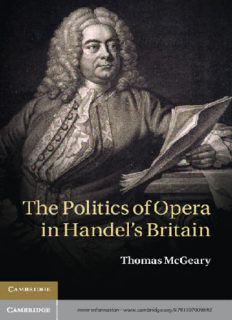
The Politics of Opera in Handel's Britain PDF
Preview The Politics of Opera in Handel's Britain
more information - www.cambridge.org/9781107009882 The Politics of Opera in Handel’s Britain The Politics of Opera in Handel’s Britain examines the involvement of Italian opera in British partisan politics in the first half of the eighteenth century, which saw Sir Robert Walpole’s rise to power and George Frideric Handel’s greatest period of opera production. McGeary argues that the conventional way of applying Italian opera to contemporary political events and persons by means of allegory and allusion in individual operas is mistaken; nor did partisan politics intrude into the management of the Royal Academy of Music and the Opera of the Nobility. This book shows instead how Senesino, Faustina, Cuzzoni, Farinelli, and events at the Haymarket Theatre were used in political allegories in satirical essays directed against the Walpole ministry. Since most operas were based on ancient historical events, the librettos – like traditional histories – could be sources of examples of vice, virtue, and political precepts and wisdom that could be applied to contemporary politics. thomas mcgeary has written extensively about the reception of Italian opera in eighteenth-century Britain and his editions and translations of Arnold Schoenberg and Harry Partch received ASCAP- Deems Taylor awards. His research has been supported by fellowships from institutions including the Newberry Library/British Academy, Paul Mellon Centre for British Art, and the American Handel Society, and his articles on art, music, and literature in eighteenth-century Britain have appeared in, among others, Music and Letters, Journal of the Royal Musical Association, Journal of Eighteenth-Century Studies, Early Music, Burlington Magazine, and Philological Quarterly. The Politics of Opera in Handel’s Britain Thomas McGeary CAMBRIDGE UNIVERSITY PRESS Cambridge, New York, Melbourne, Madrid, Cape Town, Singapore, São Paulo, Delhi, Mexico City Cambridge University Press The Edinburgh Building, Cambridge CB2 8RU, UK Published in the United States of America by Cambridge University Press, New York www.cambridge.org Information on this title: www.cambridge.org/9781107009882 © Thomas McGeary 2013 This publication is in copyright. Subject to statutory exception and to the provisions of relevant collective licensing agreements, no reproduction of any part may take place without the written permission of Cambridge University Press. First published 2013 Printed and bound in the United Kingdom by the MPG Books Group A catalogue record for this publication is available from the British Library Library of Congress Cataloguing in Publication data McGeary, Thomas, 1948– The politics of opera in Handel’s Britain / Thomas McGeary. p. cm. Includes bibliographical references and index. ISBN 978-1-107-00988-2 (hardback) 1. Opera–Political aspects–Great Britain–History–18th century. I. Title. ML3918.O64M35 2013 782.10941′09033–dc23 2012029729 ISBN 978-1-107-00988-2 Hardback Cambridge University Press has no responsibility for the persistence or accuracy of URLs for external or third-party internet websites referred to in this publication, and does not guarantee that any content on such websites is, or will remain, accurate or appropriate. Contents List of figures [page vi] List of tables [vii] Preface [ix] Notes on sources [xi] 1 Introduction [1] 2 Opera and political allegory: When is it an allegory? When is it political? [12] 3 Politics in the Royal Academy of Music [57] 4 The opera house, allegory, and the political opposition [94] 5 Handel’s Second Academy [126] 6 Rival opera companies and Farinelli in Madrid [150] 7 Politics, theater, and opera in the 1730s [180] 8 The opera stage as political history [210] Epilogue [247] Appendices 1 Political affiliation and principal offices of shareholders of the Royal Academy of Music, c.1717–22 [250] 2 Operas premiered at the Royal Academy of Music [258] 3 Directors of the Opera of the Nobility with political allegiances in June 1733 [268] 4 Operas (and other works) premiered by the Opera of the Nobility [272] 5 Hanoverian celebratory pieces [277] Notes [282] Select bibliography [372] Index [401] v Figures 2.1 Title page of Numitore, produced at the Haymarket Theatre, London, 1720. Photo: courtesy of the Newberry Library, Chicago. page [21] 2.2 Title page of Teofane, produced at Dresden, 1717. Photo: courtesy of the Sibley Music Library, Eastman School of Music, University of Rochester. [23] 2.3 Title page of Ottone, produced at the Haymarket Theatre, London, 1723. Photo: courtesy of Newberry Library, Chicago. [24] 3.1 Title page of Radamisto, produced at the Haymarket Theatre, London, 1720. Photo: courtesy of the Newberry Library, Chicago. [64] vi Tables 3.1 Finances of Heidegger’s opera company, 1713–14 to 1716–17 page [62] 3.2 Bononcini subscriptions by directors of the Royal Academy of Music, serving 1720–21 [75] 3.3 Composers of operas produced by the Royal Academy of Music [79] 6.1 Attendance by Prince Frederick and the king and queen at the rival opera companies [162] 6.2 Payments from Prince Frederick and the king to the rival opera companies [164] vii
Description: